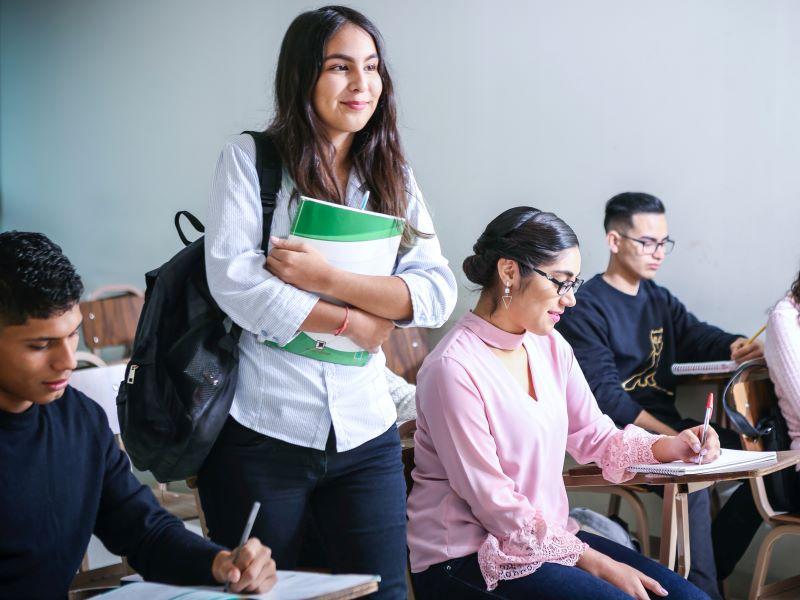What do we mean by innovation? In one of many definitions “innovation is the multi-stage process whereby organisations transform ideas into new or improved products, services or processes, in order to advance, compete and differentiate themselves successfully in their marketplace”.
It does not necessarily involve technology and its overall aim is to develop a competitive advantage for organisations. Therefore, in the context of transnational education (TNE), innovation is not limited to the adoption of digital tools but is about developing new approaches that better meet the changing needs of stakeholders in local and global communities.
Beyond the obvious trend for online provision, several other important global developments affect the competitiveness of TNE provision. Considering and addressing these global challenges when designing and implementing TNE constitutes the most important form of innovation.
Recent research and developments in higher education suggest the following trends will define the competitiveness, and therefore direction of innovation in TNE:
- Student experience and graduate employability as the two most important metrics in assessing the quality and impact of TNE programmes
- Addressing local, host country needs through TNE is now a priority for host countries and is increasing monitored by local authorities
- With the shift to remote teaching, key stakeholders including regulators, students and parents are more receptive of online learning as core mode of education provision
- Institutions, home country regulators and international bodies realise the importance of TNE in promoting several of the UN Sustainable Development Goals (SDGs) and generating impact.
Reflecting on these trends, one can identify several potential areas for innovation in TNE, which are outlined below.
Enhancing TNE student experience and employability through constructive alignment
A key innovation in TNE is to shift the focus of the design and delivery to students’ local context. Exporting institutions need to examine contextual factors such as previous schooling experience, family and social capital, that affect TNE student expectations about teaching and learning. Designing the learning environment and activities that take into account students’ prior experience, knowledge and learning preferences will promote better engagement and attainment.
Assessment design in TNE programmes should also consider students’ prior education experience, assessment culture and language barriers. By designing contextualised assessment strategies, exporting institutions will promote students’ success.
Creating customised learning outcomes that address local needs, such as the employment market and national priorities for graduate skills, as well as global needs, such as global citizenship, will contribute to the competitiveness of TNE programmes and resulting student employability.
Beyond the individual, institutional and national impact, all these innovations support the widening of participation in higher education at global scale and promote several of the UN sustainable development goals including SDG1 (ending poverty), SDG4 (providing inclusive and equitable quality education) and SDG10 (reducing inequalities).
Harnessing digital technologies for sustainability and impact in TNE operations
Digital technologies can be adopted across all parts of a TNE operation to support sustainability. Pandemic travel restrictions revealed to exporting institutions that several, if not all, of the administrative and quality assurance functions, such as academic boards and review visits, could be performed remotely without the need for international travel. Low-tech digital technologies, such as cloud computing and web conferencing, are low cost, require no specialised training, and can be easily adopted and deployed in a TNE setting to replace international travel for administrative purposes. This offers an immediate, and substantial, positive effect on the environmental footprint of the TNE programme.
Hi-tech digital technologies such as mixed reality can be used for enhancing teaching through tools such as holographic lectures and supporting practical sessions, particularly in subjects such as medical science where physical labs are difficult to develop in offshore locations. This will improve student experience, the quality of the academic provision, and generate a positive impact, especially in supporting the offshore delivery of programmes of critical value for local communities.
Prepare for a post-pandemic global delivery model
Before the pandemic, we witnessed the convergence of the different modes of HE provision. There has been an amalgamation of elements of home and TNE provision and the blurring of the boundaries between “at home” and “offshore” delivery. At the same time, with the rapid digital transformation, there is an expectation for flexible and accessible academic delivery models.
To respond to this challenge, universities need to start trialling innovative forms of academic programmes that allow a flexible delivery pattern that goes beyond the dichotomies of “at home” and TNE or face-to-face and online provision. Such programmes need to be designed for a global audience with the delivery mode readily customisable for meeting student expectations, market dynamics relating to competition and perceptions about online delivery and other contextual factors such as travel restrictions and technology infrastructures.
The pandemic and travel restrictions brought TNE under the spotlight. Many considered TNE a quick fix to overcome problems in international student mobility. However, as we exit this pandemic, the real opportunity is for universities to capitalise on their TNE provision and experience to shape their post-pandemic model. Covid could provide the catalyst universities need to work towards an effective global delivery model of higher education.
Vangelis Tsiligiris is an associate professor at Nottingham Business School, Nottingham Trent University.
If you would like advice and insight from academics and university staff delivered direct to your inbox each week, sign up for the Campus newsletter.




comment